The Bogeyman: Five Minutes with Halloween
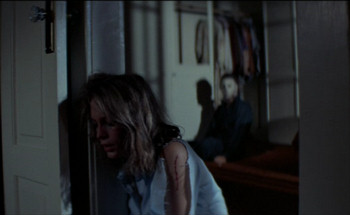 With Rob Zombie’s remake in theaters this weekend, I thought it would be a good opportunity to explore why Michael Myers (or “The Shape”) worked so well in John Carpenter’s 1978 movie Halloween.
With Rob Zombie’s remake in theaters this weekend, I thought it would be a good opportunity to explore why Michael Myers (or “The Shape”) worked so well in John Carpenter’s 1978 movie Halloween.
 With Rob Zombie’s remake in theaters this weekend, I thought it would be a good opportunity to explore why Michael Myers (or “The Shape”) worked so well in John Carpenter’s 1978 movie Halloween.
With Rob Zombie’s remake in theaters this weekend, I thought it would be a good opportunity to explore why Michael Myers (or “The Shape”) worked so well in John Carpenter’s 1978 movie Halloween.
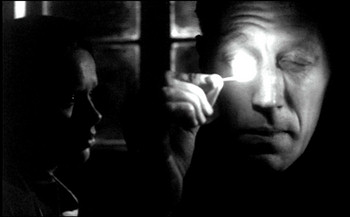 The deaths last week of movie writers and directors Ingmar Bergman and Michelangelo Antonioni have incited all sorts of commentary about the “art” films of yesteryear and the people who made them. Tied up in these discussions is one key assumption: that everyday people think these movies are boring, whether they’ve actually seen them or not.
The deaths last week of movie writers and directors Ingmar Bergman and Michelangelo Antonioni have incited all sorts of commentary about the “art” films of yesteryear and the people who made them. Tied up in these discussions is one key assumption: that everyday people think these movies are boring, whether they’ve actually seen them or not.
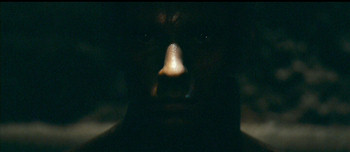 The contradictions of director/co-writer/composer Tom Tykwer’s Perfume: The Story of a Murderer start in the title, with the onomatopoeic softness and ether of a single word paired with a morbid, blunt descriptive subtitle. Both components are drawn from the novel by Patrick Süskind, but the associations that pile up and pull at each other during the movie’s opening scenes are equally Tykwer’s, cinematic and lovingly ambiguous.
The contradictions of director/co-writer/composer Tom Tykwer’s Perfume: The Story of a Murderer start in the title, with the onomatopoeic softness and ether of a single word paired with a morbid, blunt descriptive subtitle. Both components are drawn from the novel by Patrick Süskind, but the associations that pile up and pull at each other during the movie’s opening scenes are equally Tykwer’s, cinematic and lovingly ambiguous.
 With its dismal first-weekend performance at the box office, Captivity offers an opportunity to bemoan (or cheer) the diminished commercial prospects for that genre we’re no longer allowed to call “torture porn.” At The Exploding Kinetoscope, Chris Stangl recently argued (in the context of Hostel: Part II) that pinning that label on something “is a non-position that allows a critic not to engage the work.” There are some interesting arguments here, but I reject the assertion that “torture porn” isn’t an appropriate and meaningful tag for the genre. And I don’t think the phrase is a dismissive put-down.
With its dismal first-weekend performance at the box office, Captivity offers an opportunity to bemoan (or cheer) the diminished commercial prospects for that genre we’re no longer allowed to call “torture porn.” At The Exploding Kinetoscope, Chris Stangl recently argued (in the context of Hostel: Part II) that pinning that label on something “is a non-position that allows a critic not to engage the work.” There are some interesting arguments here, but I reject the assertion that “torture porn” isn’t an appropriate and meaningful tag for the genre. And I don’t think the phrase is a dismissive put-down.
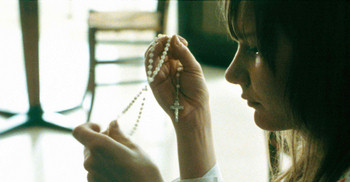 Sometimes the biggest gift a film can give us is to force us back into the real world rather than letting us escape. The German movie Requiem is about demonic possession, yet in spite of its subject matter, it’s a serious, wrenching piece. And because of its subject matter, it’s all the more effective, as the audience isn’t expecting to be challenged.
Sometimes the biggest gift a film can give us is to force us back into the real world rather than letting us escape. The German movie Requiem is about demonic possession, yet in spite of its subject matter, it’s a serious, wrenching piece. And because of its subject matter, it’s all the more effective, as the audience isn’t expecting to be challenged.
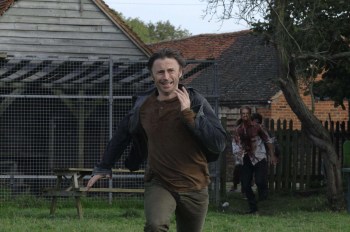 In the opening of 28 Weeks Later, Don (Robert Carlyle) faces a dilemma: He can leave his wife to die and run like hell on the off chance that he might outrun the “infected,” or he can stay with her and face a gruesome end. He runs like hell, and looks back to see his wife attacked. This is the movie writ small, laying the groundwork for more impossible choices.
In the opening of 28 Weeks Later, Don (Robert Carlyle) faces a dilemma: He can leave his wife to die and run like hell on the off chance that he might outrun the “infected,” or he can stay with her and face a gruesome end. He runs like hell, and looks back to see his wife attacked. This is the movie writ small, laying the groundwork for more impossible choices.
 I have no problem
I have no problem
choosing films of morbid love
from our Netflix queue.
 Neil Marshall’s The Descent approaches being a perfect terror movie. And because terror is unique to cinema among art forms – it doesn’t translate well to the page because the narrative has to slow down for the reader, and it doesn’t translate at all to any other medium – The Descent approaches being a perfect movie, period.
Neil Marshall’s The Descent approaches being a perfect terror movie. And because terror is unique to cinema among art forms – it doesn’t translate well to the page because the narrative has to slow down for the reader, and it doesn’t translate at all to any other medium – The Descent approaches being a perfect movie, period.
 Film Experience Blog is hosting a Vampire Blog-a-Thon just in time for Halloween. I was delighted to see that three bloggers saw fit to write about George A. Romero’s criminally overlooked Martin.
Film Experience Blog is hosting a Vampire Blog-a-Thon just in time for Halloween. I was delighted to see that three bloggers saw fit to write about George A. Romero’s criminally overlooked Martin.
 It’s admittedly unfair to want more from Slither than it’s willing to give, but I found the horror comedy from March too slight for the praise it got. Put simply: Slither lacked an agenda. Plus: Ginger Snaps, a horror-comedy hybrid that finds the right balance.
It’s admittedly unfair to want more from Slither than it’s willing to give, but I found the horror comedy from March too slight for the praise it got. Put simply: Slither lacked an agenda. Plus: Ginger Snaps, a horror-comedy hybrid that finds the right balance.